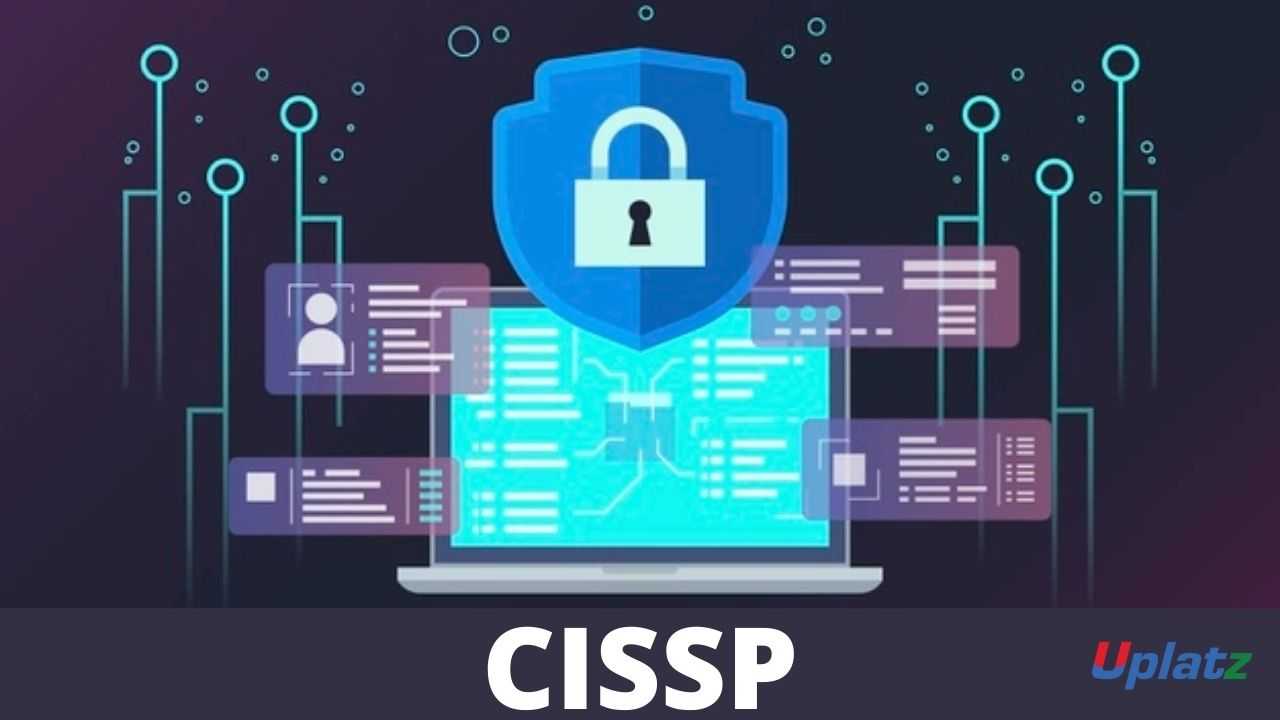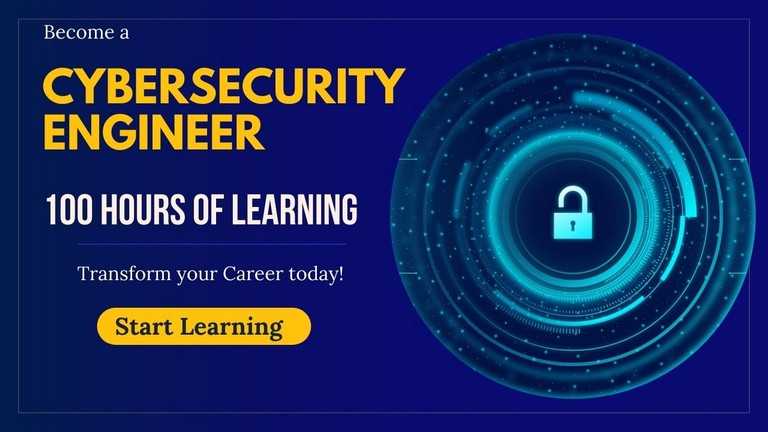Cybersecurity in a nutshell
Learn essentials of cyber security and build your skills to better protect your digital information from security threats. Become Cybersecurity expertPreview Cybersecurity in a nutshell course
Price Match Guarantee Full Lifetime Access Access on any Device Technical Support Secure Checkout Course Completion Certificate 100% Started a new career
BUY THIS COURSE (
100% Started a new career
BUY THIS COURSE (GBP 12 GBP 29 )-
 95% Got a pay increase and promotion
95% Got a pay increase and promotion
Students also bought -
-

- CISSP - Certified Information Systems Security Professional
- 55 Hours
- GBP 12
- 462 Learners
-

- Career Path - Cybersecurity Engineer
- 100 Hours
- GBP 32
- 1240 Learners
-

- Premium Career Track - Chief Technology Officer (CTO)
- 1000 Hours
- GBP 39
- 5214 Learners

Course/Topic 1 - Coming Soon
-
The videos for this course are being recorded freshly and should be available in a few days. Please contact info@uplatz.com to know the exact date of the release of this course.
Course/Topic 2 - Course access through Google Drive
-
Google Drive
-
Google Drive
The "Cyber Security in a Nutshell" course is designed to provide participants with a comprehensive understanding of essential cyber security principles and practices. This course aims to equip learners with foundational knowledge and practical skills needed to protect information systems and mitigate security risks effectively. Key Objectives of this course are to Understand Cyber Security Fundamentals, Identify and Assess Security Threats, and to Understand Network Security Principles. This course is ideal for individuals seeking a foundational understanding of cyber security, including IT professionals, business managers, and anyone interested in learning how to protect themselves and their organizations from cyber threats.
-Key Course Objectives-
Introduction to Cyber Security concepts and principles
Overview of common cyber threats and attack vectors
Importance of cyber security in modern organizations
Fundamentals of cryptography and encryption techniques
Network security principles and best practices
Secure coding practices and software security
Web application security vulnerabilities and mitigation strategies
Endpoint security and protection mechanisms
Identity and access management (IAM)
Incident response and disaster recovery planning
Compliance and regulatory requirements in cyber security
Emerging trends in cyber security (AI in cyber security, IoT security)
Hands-on exercises and simulations to reinforce learning
Case studies and real-world examples of cyber security incidents
This syllabus provides a broad overview of the essential topics typically covered in a foundational course on Cyber Security, designed to equip learners with fundamental knowledge and skills in protecting information systems and networks from cyber threats.
1. Certified Information Systems Security Professional (CISSP)
Overview: Offered by (ISC)², CISSP is a globally recognized certification focusing on various aspects of information security, including risk management, security architecture, and operations.
Benefits:
Comprehensive Knowledge: Covers a wide range of security topics, providing a holistic view of cybersecurity.
Industry Recognition: Highly regarded in the industry, enhancing your credibility as a security professional.
Career Advancement: Opens doors to senior roles in cybersecurity and higher earning potential.
2. Certified Ethical Hacker (CEH)
Overview: Offered by EC-Council, CEH focuses on ethical hacking techniques, penetration testing, and vulnerability assessment to identify and mitigate security threats.
Benefits:
Practical Skills: Provides hands-on knowledge of ethical hacking tools and techniques.
Industry Demand: Highly sought after for roles involving penetration testing and security analysis.
Certification Prestige: Recognized globally as a benchmark for ethical hacking expertise.
3. CompTIA Security+
Overview: CompTIA Security+ is an entry-level certification that covers fundamental security concepts, including network security, threat management, and cryptography.
Benefits:
Foundational Knowledge: Ideal for beginners, offering a solid foundation in cybersecurity principles.
Vendor-Neutral: Applies to various technologies and platforms, making it versatile.
Career Start: Provides a stepping stone into the cybersecurity field and helps with obtaining more advanced certifications.
4. Certified Information Security Manager (CISM)
Overview: Offered by ISACA, CISM focuses on information security management, including governance, risk management, and incident response.
Benefits:
Management Focus: Emphasizes the management and oversight aspects of cybersecurity.
Leadership Opportunities: Prepares you for roles in security management and governance.
Industry Recognition: Well-respected among security managers and executives.
5. Certified Information Systems Auditor (CISA)
Overview: Also offered by ISACA, CISA focuses on auditing information systems, including control and assurance, risk management, and compliance.
Benefits:
Audit Skills: Validates your ability to audit and assess information systems and controls.
Career Advancement: Opens opportunities in auditing and compliance roles within cybersecurity.
Industry Credibility: Recognized for expertise in system auditing and control.
6. Certified Cloud Security Professional (CCSP)
Overview: Offered by (ISC)², CCSP focuses on cloud security principles, including cloud architecture, governance, risk management, and compliance.
Benefits:
Cloud Expertise: Validates your knowledge of securing cloud environments and services.
High Demand: Increasingly relevant as organizations adopt cloud technologies.
Enhanced Skills: Provides expertise in managing and securing cloud-based assets.
7. Offensive Security Certified Professional (OSCP)
Overview: Offered by Offensive Security, OSCP is a hands-on certification focusing on penetration testing and ethical hacking techniques.
Benefits:
Practical Experience: Emphasizes real-world penetration testing skills through a challenging exam.
Advanced Skillset: Demonstrates advanced technical expertise in ethical hacking.
Reputation: Highly respected within the penetration testing community.
8. Certified Cybersecurity Analyst (CySA+)
Overview: Offered by CompTIA, CySA+ focuses on threat detection, analysis, and response, emphasizing cybersecurity operations.
Benefits:
Operational Skills: Provides knowledge of monitoring and responding to security threats.
Career Growth: Suitable for roles in threat detection and security operations.
Vendor-Neutral: Applies to various tools and platforms used in cybersecurity operations.
9. Certified in Risk and Information Systems Control (CRISC)
Overview: Offered by ISACA, CRISC focuses on risk management and control in information systems.
Benefits:
Risk Management Expertise: Validates your skills in identifying and managing information system risks.
Strategic Insight: Useful for roles involving risk assessment and mitigation.
Career Advancement: Enhances qualifications for senior risk management positions.
10. Certified Secure Software Lifecycle Professional (CSSLP)
Overview: Offered by (ISC)², CSSLP focuses on secure software development practices, including secure coding, testing, and lifecycle management.
Benefits:
Software Security: Validates your ability to integrate security throughout the software development lifecycle.
Specialized Knowledge: Ideal for roles involving secure software development and application security.
Industry Recognition: Recognized for expertise in developing secure software solutions.
By pursuing these certifications, cybersecurity professionals can validate their skills, advance their careers, and stay current with industry standards and practices.
After completing the course "Cyber Security in a Nutshell," individuals can pursue various roles within the cybersecurity field, depending on their prior experience, additional qualifications, and the depth of the course content. Here are some typical job roles and potential salary ranges associated with completing such a course:
Cybersecurity Analyst-Salaries for cybersecurity analysts typically range from $70,000 to $110,000 per year.
Information Security Specialist-Salaries for information security specialists can range from $75,000 to $120,000 per year.
Cybersecurity Consultant- Salaries for cybersecurity consultants typically range from $80,000 to $140,000 per year.
Incident Response Analyst-Salaries for incident response analysts can range from $80,000 to $130,000 per year.
Security Operations Center (SOC) Analyst-Salaries for SOC analysts typically range from $65,000 to $110,000 per year.
Cybersecurity Manager / Director-Salaries for cybersecurity managers or directors can range from $100,000 to $180,000 per year.
These salary ranges are approximate and can vary based on factors such as geographic location, industry sector (technology, finance, government), specific skills and certifications (such as CISSP - Certified Information Systems Security Professional), years of relevant experience, and the size of the organization. Continuous learning, staying updated with cybersecurity threats and defenses, and obtaining relevant certifications can further enhance career prospects and earning potential in the cybersecurity field.
1. What is Cryptography?
Cryptography is the practice and study of techniques for securing information and communication mainly to protect the data from third parties that the data is not intended for.
2. What is the difference between IDS and IPS?
IDS is Intrusion Detection System and it only detects intrusions and the administrator has to take care of preventing the intrusion. Whereas, in IPS i.e., Intrusion Prevention System, the system detects the intrusion and also takes actions to prevent the intrusion
3. What is traceroute? Why is it used?
Traceroute is a tool that shows the path of a packet. It lists all the points (mainly routers) that the packet passes through. This is used mostly when the packet is not reaching its destination. Traceroute is used to check where the connection stops or breaks to identify the point of failure.
4. What is a Botnet?
A Botnet is a number of devices connected to the internet where each device has one or more bots running on it. The bots on the devices and malicious scripts used to hack a victim. Botnets can be used to steal data, send spams and execute a DDOS attack.
5. What is a firewall?
A firewall is a system that monitors incoming and outgoing traffic on the network. It analyses all the activities carried out by users on the network and matches it with predefined policies. If there are any violations or deviations from the set policies, the traffic is blocked. It is highly helpful against common cybersecurity threats such as trojans, viruses, malware, etc.
6. What is a VPN?
VPN stands for Virtual Private Network. It is used for data protection against spoofing, censorship, and interference from higher authorities.
7. What are DDoS attacks?
DDoS is an abbreviation for Distributed Denial of Service. It makes servers unavailable when they are occupied and cannot be handled.
A DDoS attack attempts to disrupt normal traffic of the target server or network by overloading it with Internet traffic.
DDoS attacks can be further classified into flooding attacks and crash attacks.
8. What do you understand by phishing?
Phishing is a type of attack which is often used to steal private data and credentials.
It uses fraudulent emails or messages which lead unsuspecting people to click on malicious URLs and fake websites in disguise.
Phishing can have dangerous results like malware being installed on a system, ransomware attacks, stealing money, exposing sensitive information, identity theft, etc.
9. How does the ransomware function?
Ransomware is used to launch malicious attacks on systems, hold them “hostage” and extort money and/or information.
It encrypts the target system’s data, making it inaccessible or corrupt.
Attackers can then demand a ransom amount from the victim in exchange for the decryption key for the unreadable data and restoring access.
10. Define Botnet. Is It Crucial in Cybersecurity?
A botnet is a sophisticated, centrally coordinated malware-infected network controlled by a remote attacker. Each controlled device within this network is considered a bot. Large-scale botnets can consist of millions of bots, enabling cybercriminals to launch massive attacks. Botnets are capable of executing distributed denial-of-service attacks (DDoS attacks), brute force attacks, and more. The term “botnet” is shorthand for “robot network.” Because botnets can cause extensive damage, combating these types of attacks is crucial in the field of cybersecurity
11. What Is SSL Encryption?
SSL (Secure Sockets Layer) encryption serves to create a secure internet connection. SSL encryption protects client-client, server-server, and client-server connections, circumventing unauthorized parties from monitoring or tampering with data transmitted online. An updated protocol called TLS (Transport Layer Security) encryption has replaced SSL encryption as the standard security certificate.
12. What Is Forward Secrecy?
Forward secrecy is a feature of certain key agreement protocols that generates a unique session key for each transaction. Thanks to forward secrecy, an intruder cannot access data from more than one communication between a client and a server—even if the security of one communication is compromised.
13. What Are Spyware Attacks?
Spyware is a kind of malware that is covertly installed on a targeted device to collect private data. Spyware can infiltrate a device when a user visits a malicious website, opens an infected file attachment, or installs a program or application containing spyware. Once installed, the spyware monitors activity and captures sensitive data, later relaying this information back to third-party entities.
14. What is the main objective of cyber security?
Ans
Cybersecurity aims to protect the computers, networks, and software programs from such cyber attacks. Most of these digital attacks are aimed at accessing, altering, or deleting sensitive information; extorting money from victims; or interrupting normal business operations
15. Where is cyber security used?
Ans
Cybersecurity is the protection of internet-connected systems such as hardware, software and data from cyberthreats. The practice is used by individuals and enterprises to protect against unauthorized access to data centers and other computerized systems.
16. What are the 7 types of cyber security?
Ans
Malware. Malware is malicious software such as spyware, ransomware, viruses and worms.
Emotet.
Denial of Service.
Man in the Middle.
Phishing.
SQL Injection.
Password Attacks.
17. What are the 3 elements of good cyber security?
Ans
The CIA triad refers to an information security model made up of the three main components: confidentiality, integrity and availability.
18. What are the 5 best methods used for cyber security?
Ans
Keep Your Software Up to Date.
Use Anti-Virus Protection & Firewall.
Use Strong Passwords & Use a Password Management Tool.
Use Two-Factor or Multi-Factor Authentication.
Learn about Phishing Scams – be very suspicious of emails, phone calls, and flyers.









